Mentorship is embedded in the Distinguished Scholars Program (DSP). Each DSP cohort has highly respected senior investigators at the NIH who serve as dedicated mentors but also as advocates and sponsors.
Current Mentors
Alan G. Hinnebusch, Ph.D.

NIH Distinguished Investigator
Section on Nutrient Control of Gene Expression
Eunice Kennedy Shriver National Institute of Child Health and Human Development (NICHD)
Dr. Alan G. Hinnebusch was born in Pittsburgh, PA, and grew up outside of Pittsburgh and in Canton, OH. He received a B.S. in biology from the University of Dayton and a Ph.D. in biochemistry and molecular biology from Harvard University. After postdoctoral work in yeast genetics at Cornell University and MIT, he became a faculty member at the NICHD. He is a fellow of the American Academy of Microbiology and the Association for the Advancement of Science, and the American Academy of Arts and Sciences, and a member of the National Academy of Sciences. His research focuses on fundamental mechanisms in the assembly and function of translation initiation complexes during protein synthesis, exploiting the powerful combination of genetics and biochemistry of the yeast model system.

Stephanie J. London, M.D., Dr.P.H.
Senior Investigator
Immunity, Inflammation, and Disease Laboratory / Integrative Genomic Epidemiology Group
National Institute of Environmental Health Sciences (NIEHS)
Dr. Stephanie London was born and raised in New York City. She earned a B.A. from Harvard College, an M.D. from Harvard Medical School, and an M.P.H in occupational health and a Dr.P.H. in Epidemiology from the Harvard T.H. Chan School of Public Health. She completed a residency in internal medicine at the Massachusetts General Hospital. She is board certified in both internal medicine and preventive medicine, with a specialty in occupational and environmental medicine. She was an assistant professor in the Department of Preventive Medicine at the University of Southern California School of Medicine before joining NIEHS in 1995. Dr. London’s work focuses on environmental, genetic, and epigenetic factors, and their interactions, in relation to health outcomes across the life-course. Outcomes of primary interest include asthma, allergies, pulmonary function, and chronic obstructive pulmonary disease. Her group follows selected human genomic findings using mouse models.

Pamela L. Schwartzberg, M.D., Ph.D.
Senior Investigator
Cell Signaling and Immunity Section
National Institute of Allergy and Infectious Diseases (NIAID)
Dr. Pamela Schwartzberg received her B.A. from Princeton University and her M.D. and Ph.D. from the Columbia College of Physicians and Surgeons, Columbia University. She completed an internship at Boston Children's Hospital and a fellowship as a special fellow of the Leukemia and Lymphoma Society at the National Cancer Institute, before starting her own laboratory at the National Human Genome Research Institute. After becoming a Senior Investigator with tenure, she moved to the NIAID. Dr. Schwartzberg is an adjunct faculty member at the University of Pennsylvania and has received several NIH awards for mentoring. She has served on numerous mentoring, reviewing, and editorial boards and is the recipient of a Searle Scholar's Award and the American Association of Immunologists BD-Pharmingen Biosciences Award for Early Career Scientists. She has also been elected to the American Society for Clinical Investigation, the Henry Kunkel Society, and the Association of American Physicians. Her research focuses on signaling pathways in T lymphocytes, with an emphasis on understanding molecules that are affected by primary immunodeficiencies and how they regulate normal immune cell development and function.
Past Mentors
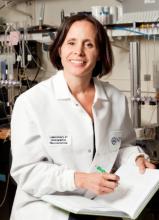
Veronica Alvarez, Ph.D.
Senior Investigator
National Institute on Alcohol Abuse and Alcoholism
National Institute on Drug Abuse
Laboratory on Neurobiology of Compulsive Behaviors
Lead Investigator, Center on Compulsive Behaviors
Dr. Alvarezgraduated with honors and received a PhD degree in Neuroscience from the University of Buenos Aires in Argentina. She did postdoctoral research at the Vollum Institute of Oregon Health and Science University and at Harvard Medical School. She joined the NIH as an investigator in 2008, achieving tenure in 2015. Dr. Alvarez’s research is focused on identifying the circuits and understanding the synaptic mechanisms that drive reward seeking, reinforcement and compulsive behaviors. Her laboratory studies the effects of drugs of abuse on synapses and neuronal connectivity with the main focus on stimulant drugs and alcohol. She received the NIH Honor Award in 2015 and the Outstanding Mentor Award in 2015 and 2018, as well as the 2017 DDIR Innovation Award and 2018 Challenge Award to support the creation of the Center on Compulsive Behaviors at the NIH.
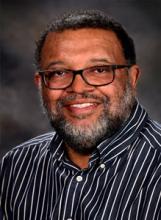
Trevor Archer, Ph.D.
NIH Distinguished Investigator
National Institute of Environmental Health Sciences (NIEHS)
Chief, Epigenetics & Stem Cell Biology Laboratory
Dr. Archer received a Ph.D. in Biochemistry at Queen's University in Canada, after which he did postdoctoral training on chromatin gene transcription and steroid receptors at the National Cancer Institute, in Bethesda. In 1992, he joined the University of Western Ontario in Canada as a National Cancer Institute of Canada Scientist. He was recruited to the NIEHS in 1999 as head of Chromatin Structure and Gene Expression. In 2003, he was appointed as Chief, Laboratory of Molecular Carcinogenesis, and in 2014 he became the founding chief of the new Epigenetics and Stem Cell Biology laboratory at NIEHS. Dr. Archer has made numerous original and important contributions to the study of chromatin structure/function, epigenetics, and gene regulation in cancer cells. These studies have provided important insights into the potential regulatory role of chromatin remodeling protein complexes in modulating the activity of transcription factors.

Carolina Barillas-Mury, M.D., Ph.D.
NIH Distinguished Investigator
National Institute of Allergy and Infectious Diseases
Chief, Mosquito Immunity and Vector Competence Section
Dr. Barillas-Mury received her M.D. from “Universidad Francisco Marroquin de Guatemala” and her Ph.D. from the University of Arizona. She did her post-doctoral training at Harvard University and at the European Molecular Biology Laboratory in Germany. She joined the NIH in 1993 and became a NIH Distinguished Investigator in 2016. She is interested in understanding the interactions between the mosquito immune system and Plasmodium parasites that are critical for malaria transmission, with the ultimate goal of disrupting the parasite’s life cycle and preventing human disease. Dr. Barillas-Mury received the 2010 Bailey K. Ashford Medal from the American Society of Tropical Medicine & Hygiene (ASTMH) and the 2013 Sanofi/Pasteur Award in Tropical and Neglected Diseases, as well as being elected a member of the National Academy of Sciences in 2014. She received a Doctor Honoris Causa from Universidad del Valle de Guatemala in 2016, was named 2017 Alumni of the Year at the University of Arizona, and became a Fellow of ASTMH in 2017 and of the Entomological Society of America in 2020.
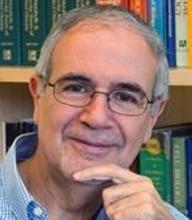
Juan S. Bonifacino, Ph.D.
NIH Distinguished Investigator
Eunice Kennedy Shriver National Institute of Child Health and Human Development
Associate Scientific Director, Neurosciences and Cellular and Structural Biology Division
Head, Section on Intracellular Protein Trafficking
Dr. Bonifacino received his Ph.D. in Biochemistry at the University of Buenos Aires, Argentina. He was a post-doctoral fellow at the NIH, studying the mechanisms of assembly and quality control of multi-protein complexes in the endoplasmic reticulum. He rose through the ranks to his current position as Associate Scientific Director of the Neurosciences and Cellular and Structural Division, Head of the Section on Intracellular Protein Trafficking at NICHD. His laboratory investigates the molecular mechanisms by which proteins are delivered to different cellular compartments, and the diseases that result from dysfunction of these mechanisms. Specific projects include the study of coat proteins involved in intracellular transport, polarized sorting in neurons, organelle positioning and motility, endosomal retrieval pathways, and neurodevelopmental disorders caused by defects in these processes. Dr. Bonifacino was appointed NIH Distinguished Investigator in 2008 and Fellow of the American Society for Cell Biology in 2018.

Susan K. Buchanan, Ph.D.
Senior Investigator
National Institute of Diabetes and Digestive and Kidney Diseases
Chief, Laboratory of Molecular Biology
Deputy Scientific Director
Dr. Buchanan is Chief of the Section on Structural Biology of Membrane Proteins in the National Institute for Diabetes and Digestive and Kidney Diseases (NIDDK), at the National Institutes of Health. She received her Ph.D. from the Johann-Wolfgang-Goethe Universität in Frankfurt, Germany in 1990. She completed postdoctoral fellowships at the MRC Laboratory of Molecular Biology, Cambridge, UK, and at UT Southwestern Medical Center, Dallas, before returning to the UK to establish a research group at Birkbeck College, London in 1998. She joined the NIDDK as a tenure-track investigator in 2001, was tenured in 2008, was promoted to Chief of the Laboratory of Molecular Biology in 2014, and became NIDDK Deputy Scientific Director in 2018. Dr. Buchanan’s lab uses an integrated approach combining structural, biophysical, and biochemical techniques to understand the essential processes of membrane protein folding and integration, transport of vital nutrients into bacteria and mitochondria, and transport of protein toxins across the outer membrane.

T. Jake Liang, M.D.
NIH Distinguished Investigator
National Institute of Diabetes and Digestive and Kidney Diseases
Chief, Liver Diseases Branch
Deputy Director of Translational Research
Dr. Liang is a graduate of Harvard College and Harvard Medical School. He completed his postgraduate training at Harvard Medical School, where he was an Assistant Professor of Medicine from 1990-1996. He is an internationally renowned thought leader and investigator in the field of viral hepatitis and liver diseases. His research program focuses on the virology, pathogenesis and therapeutic development of viral hepatitis and liver cancer. Dr. Liang has been an Associate Editor for the medical journals Gastroenterology, Hepatology, and Gut. He served on the Governing Board of the American Association for the Study of Liver Diseases (AASLD) and was its President in 2011. His outstanding contributions has been recognized with numerous national awards including the AASLD Distinguished Mentor/Clinician Educator Award and the AGA Distinguished Achievement Award in Basic Science. He was elected to the American Society for Clinical Investigation, the Association of American Physicians, to the AAAS as a Fellow, the American Academy of Microbiology, and the National Academy of Medicine.

Sharon A. Savage, M.D.
Senior Investigator
National Cancer Institute, Division of Cancer Epidemiology and Genetics
Chief, Clinical Genetics Branch
Clinical Director
Dr. Savage is the Chief of the Clinical Genetics Branch and Clinical Director of the Division of Cancer Epidemiology and Genetics (DCEG) at the National Cancer Institute (NCI). She received her M.D. from the University of Vermont College of Medicine, completed residency in Pediatrics at Children’s National Medical Center, Washington, DC, and fellowship in Pediatric Hematology-Oncology in the combined NCI-Johns Hopkins program. Dr. Savage joined the Clinical Genetics Branch in 2006 as a tenure-track investigator and was awarded tenure in 2012. She has been leading the Clinical Genetics Branch as Branch Chief since 2013. Dr. Savage was appointed Clinical Director of DCEG, NCI in 2019. Dr. Savage's internationally recognized research program effectively combines clinical, genetic, and epidemiologic studies to advance understanding of cancer etiology and improve the lives of individuals with complex cancer-prone disorders.
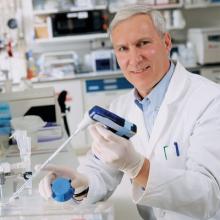
John Schiller, Ph.D.
NIH Distinguished Investigator
National Cancer Institute
Laboratory of Cellular Oncology
Dr. Schiller received his bachelor’s degree in Molecular Biology from the University of Wisconsin and his master’s and Ph.D. degrees in Microbiology from the University of Washington. He is currently a NIH Distinguished Investigator and Section Chief in the Laboratory of Cellular Oncology, Center for Cancer Research, National Cancer Institute. In his 35 years at the NCI, Dr. Schiller has studied papillomavirus molecular biology, immunology and epidemiology. His current interests include papillomavirus virion assembly and infection, single dose prophylactic HPV and therapeutic HPV vaccines, and virus-like particle (VLP)-based vaccines and therapies for other infectious diseases and cancers. He and Dr. Douglas Lowy have received numerous awards for their work developing VLP vaccines to prevent the HPV infections that cause cervical and other cancers, including the 2007 Sabin Gold Medal Award, the 2014 National Medal of Technology and Innovation, and the 2017 Lasker-DeBakey Clinical Medical Research Award.
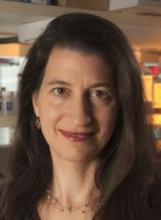
Julie Segre, Ph.D.
Senior Investigator
National Human Genome Research Institute
Chief, Translational and Functional Genomics Branch
Head, Microbial Genomics Section
Dr. Segre received her B.A. in Mathematics from Amherst College, her Ph.D. in Genetics from the Massachusetts Institute of Technology, and postdoctoral training at the University of Chicago. She has been an investigator at NHGRI since 2000, receiving tenure in 2007. Dr. Segre’s laboratory studies the human skin microbiome, beginning with foundational studies defining the indigenous bacterial, fungal and viral communities, as well as hospital outbreaks of multi-drug resistant bacteria. Her research integrates DNA sequence technology, algorithm development, and clinical studies to explore the diversity of microbes in and on humans in health and disease. Together with NIH epidemiologist Dr. Tara Palmore, Dr. Segre received the 2013 Service to America Medal, considered among the most prestigious for a federal employee, for their work to establish the clinical utility of microbial genomics.
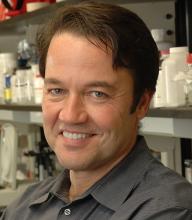
John Tisdale, M.D.
Senior Investigator
National Heart, Lung, and Blood Institute
Chief, Cellular and Molecular Therapeutics Branch
Director, Trans-NIH Intramural Sickle Cell Program
Dr. Tisdale received his M.D. degree from the Medical University of South Carolina in Charleston, where he also received his B.A. in Chemistry. He completed an internal medicine and chief residency at Vanderbilt University Medical Center and then trained in hematology and was a postdoctoral fellow at NHLBI. He joined the Molecular and Clinical Hematology Branch of NHLBI in 1998 and is now the Chief of the Cellular and Molecular Therapeutics Branch. Dr. Tisdale’s research and clinical work center on sickle cell disease. His group focuses on developing curative strategies for sickle cell disease through transplantation of allogeneic or genetically modified autologous bone marrow stem cells. In 2011 the College of Charleston recognized Dr. Tisdale with the Alumni of the Year Award and the Pre-Medical Society’s Outstanding Service Award in Medicine. He was elected to the American Society for Clinical Investigation and is a member of the American Society of Hematology.

Paul Wade, Ph.D.
Senior Investigator
National Institute of Environmental Health Sciences
Acting Chief, Epigenetics and Stem Cell Biology Laboratory
Dr. Wade received the Ph.D. degree in Molecular, Cellular and Developmental Biology from Indiana University. He was a postdoctoral fellow in the National Institute of Child Health and Human Development where he studied protein complexes involved in chromatin remodeling and histone acetylation. Dr. Wade’s first faculty appointment was as an Assistant Professor in the Department of Pathology and Laboratory Medicine at Emory University. He was recruited to the National Institute of Environmental Health Sciences (NIEHS) in 2004 as the head of the Eukaryotic Transcriptional Regulation group. Dr. Wade was awarded tenure at NIEHS in 2009 and became Deputy Chief of the Laboratory of Molecular Carcinogenesis in 2013. He became the Acting Chief of the Epigenetics and Stem Cell Biology Laboratory in 2022. Dr. Wade’s research program studies how transcription factors penetrate the chromatin barrier to form new enhancers. His group also investigates how environmental factors, including diet, influence disease risk through modulation of the epigenome.

